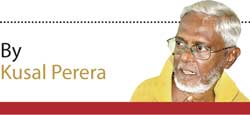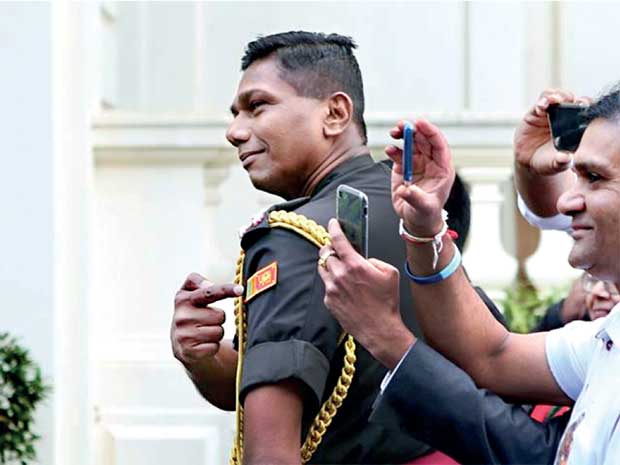Voting tomorrow: SL will remain SL SL would continue to be with China economically and growing Sinhala dominance politically
Posted on February 9th, 2018
Kusal Perera Courtesy The Daily Mirror
Fate of Sri Lanka already decided by other factors that led to the election after this Unity Government
No strong assurances on investments from the West compelled the Unity Government to turn towards China
This Government’s position is no different to that of Rajapaksa’s
President Sirisena continuously contradicted his own pledges on non-interference
President Sirisena continuously contradicted his own pledges on non-interference
Tomorrow Saturday, February 10, 15.8 million people have been called to vote at the long-delayed Local Government Elections to establish 341 councils.

A half-hour after polls close, counting will begin at polling booths themselves for Ward representations.
That result can be declared tomorrow evening itself, according to statements made by the Elections Commission. Ward level elected representation this time in LG bodies comes after almost 49 years with an addition. This time it comes with 40 percent more councillors elected on proportional representation.
For all the calculations required, including 25 percent mandatory women representation, would take another 24 hours or more.
For voters to know where they stand on how they voted, they may have to wait for another day at least. Meanwhile, there will be guessing done on the outcome of Ward based results, that can indicate which way the wind blows.
Leaving predictions on results and horoscope reading of leaders, for post-election recreation, what can be said with certainty is, the fate of Sri Lanka will not be decided by election results.

Brigadier Priyanka Fernando
The fate of Sri Lanka has already been decided by other factors that led to the election after this Unity Government dodged voters for over two years.
The year 2016 led to the year 2017 with conflicts brewing between the United National Party (UNP) and President Sirisena’s faction of the SLFP in Government.
In a Government that was proudly hyping its ability to have defeated Rajapaksa and nothing more, they included everything from economics to politics to personality clashes.
A wholly unprincipled alliance it is, with no clear economic strategy and left to continue on fast-tracked free market economics, this Unity Government was unable to stay within the expected geopolitical framework of the Western allies.
It is common knowledge in the West, especially the US administration and the EU wanted this Yahapalana Government to distance itself from Chinese influence, Rajapaksa established.
Therefore in 2015 January, the West expected a Government led by their trusted political ally, the UNP, to change course. The new UNP led Yahapalana Government, in turn, expected the US and the EU to step in with investments and financial aid to prop up the economy and overcome unaccounted for borrowings during the Rajapaksa era.
However, there were no strong assurances on such investments which compelled the Unity Government to turn towards China again.
After the change of regime in 2015 January, with expected support from the West, Sri Lanka agreed to have alleged war crimes and crimes against humanity probed with international participation on a Co-sponsored Resolution adopted at the UNHRC Sessions in Match 2016.
On the Co-sponsored Resolution, the Unity Government also agreed to have the Prevention of Terrorism Act (PTA) repealed and replaced by another with internationally accepted standards, establish mechanisms for investigations into enforced disappearances and also provide a political solution to long-neglected Tamil aspirations among many others.
The West would use Tamil diaspora protests and agitations to their advantage. Diaspora activities, in turn, would be used here in the South to strengthen Sinhala Buddhist politics
With such assurances on the card, the TNA leadership has been supporting the Unity Government expecting to have a new Constitution that would provide a Federal State or something close to that and more than the present 13A.
We would complete two years one month after the LG Elections conclude since the Co-sponsored UNHRC Resolution was adopted and made Sri Lanka binding to adhere and implement its agreed terms and conditions.
It is now almost two years since this Unity Government gradually withdrew from its international commitments.
Backtracking began with President Sirisena announcing he would not agree to international interferences in probing ‘war heroes’.
He thereafter ruled out any investigations that could involve war heroes, with PM Wickremesinghe endorsing that to continue
in Government.
Thus there is neither internationally-supported investigation into alleged war crimes and crimes against humanity nor local investigations.
President Sirisena has very emphatically said there would be no investigations into alleged war crimes, leaving the PM non-committal on that.
Now, this Government’s position is no different to that of Rajapaksa’s.
War heroes have not committed crimes during the war. They liberated Sri Lanka from separatist Liberation Tigers of Tamil Eelam (LTTE)”.
Therefore, by its own rationale the Office on Missing Persons (OMP) Bill that was passed in Parliament in 2016 August, does not require implementing and still remains to be activated and enforced after one year and six months.
The PTA too remains with a proposed draft for replacement opposed by HR activists as more crude and brutal than the PTA itself.
This also provides political importance to the security forces. With especially in the North, more and continuing protests demanding private land occupied by security forces, answers for enforced disappearances and against continued heavy military presence, all interpreted by intelligence as linked to unknown LTTE presence in the diaspora, security forces have been turned into a necessary political factor in the Sinhala South.
With embedded journalism giving credence to these tall stories of a possible regrouping of LTTE remnants, the two major political parties in Colombo give weight to security forces in making political decisions.
The Co-sponsored UN Resolution almost forgotten here in Sri Lanka, in international fora where the West dictates terms, Sri Lanka has once again become a sore thumb.
With a change of regime in 2015 January that was only possible with Tamil and Muslim communities voting anti-Rajapaksa, both international HR and interest groups and the Tamil diaspora expected some sanity in the new Government in resolving post-war issues.
So did the people in the North-East, who voted out Rajapaksa.
All of them have been terribly misled and let down leading to protests and agitations. As I tweeted two days ago, …some now believe it’s the LTTE path to freedom. Some believe the TNA would create enough space to continue and some others are struggling to find alternate paths”.
There is definitely resentment building up in European and North American cities like in Kepapulavu, with renewed Tamil diaspora campaigns.
The London pro-LTTE protest in front of the Sri Lankan High Commission on the Independence Day is proof.
The fault is not with protesting Tamil groups wherever they are. That fault is with the Sinhala political leaders.
As I tweeted, Fault lies with Sinhala political leadership (irrespective of parties) that cannot accept the answer lies in decent and civilized compromise for equality and human dignity”.
Sadly racial insanity not only prevails but also grows with this Government leadership that was brought to power to do exactly the opposite.
There is no doubt, this Sinhala Buddhist dominance would keep growing post-LG Elections from how President Sirisena, who will be in office till 2020 acted on the London High Commission political mess (Not diplomatic as most would want to say) on Independence Day.
There were strong protests in London and an official protest from Her Majesty’s Government that compelled the Ministry of Foreign Affairs (MoFA) to immediately issue a public communiqué accepting it was unwarranted on the part of the Defence Attaché Brigadier Priyanka Fernando and announcing he would be immediately removed.
Within 24 hours as reports say, President Sirisena intervened and instructed the MoFA to withdraw its decision immediately and allow the Defence Attaché to resume work.
President Sirisena has continuously contradicted his own pledge to be a non-interfering President and would not usurp powers as Rajapaksa did.
Where his Sinhala Buddhist image matters, he has always interfered on his own volition to change Ministry and Cabinet decisions using his powers as Executive President.
The Post-LG Elections, in his bid to wrest total political power in Government, there is every possibility this Sinhala Buddhist dominance would be on the high.
The Post-LG Election period would, therefore, drag Sri Lanka into more resentment in international fora including the next scheduled UNHRC Sessions in March.
Already the EU Joint Staff Working Document (SWD/2018/31 Final) on Special Incentive Arrangement for Sustainable Development and Good Governance (‘GSP+’) assessment of Sri Lanka covering the period 2016 – 2017” reels out their resentment in very diplomatic but strong words.
We are fundamentally back to where we were. Post LG elections we would continue to be with China economically and with growing Sinhala dominance politically.
Thus it would not be voters at the LG elections who would decide the fate of Sri Lanka, but Chinese presence and Western geopolitical interests.
Obviously, the West would use Tamil diaspora protests and agitations to their advantage. Diaspora activities, in turn, would be used here in the South to strengthen Sinhala Buddhist politics.
It is a life of a stubborn racist society dominating others for no real democratic and civilised advantage, despite elections that are mere procedural interventions.